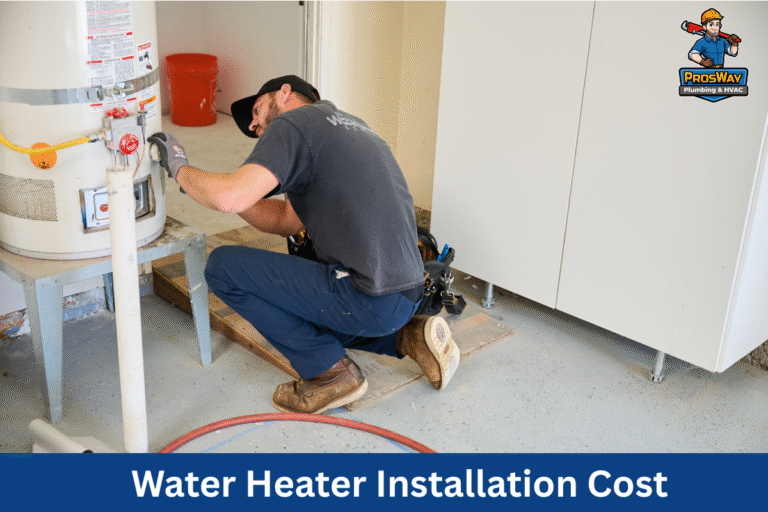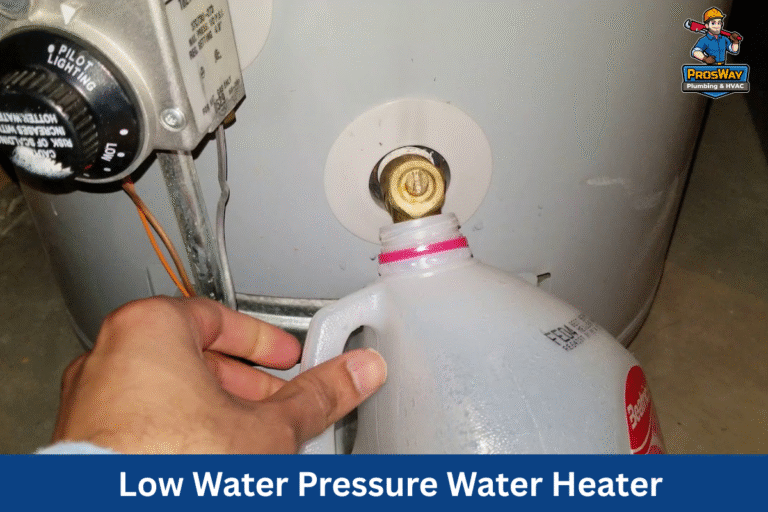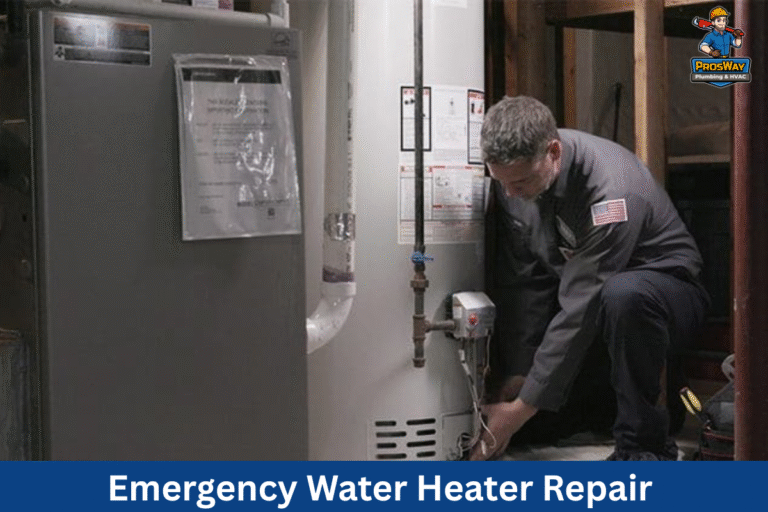When planning a new water heater, most homeowners wonder about the water heater installation cost. The truth is, water heater installation costs vary widely depending on the system type, size, and installation complexity. A tankless unit has a very different price range compared to a traditional storage tank.
Gas water heaters may need venting upgrades, while electric units often require wiring or breaker adjustments. Labor costs, permits, and regional pricing add another layer to the total bill. This guide breaks down installation costs by type and highlights the factors that really drive pricing.
Average Water Heater Installation Cost in 2025
On average, installing a water heater in 2025 costs between $700 and $3,500 nationwide. The wide gap comes from differences in model type, labor requirements, and location.
- Labor Costs: Expect a licensed plumber to charge $50–$150 per hour. Total labor usually runs $300–$1,000, depending on if it’s a simple replacement or a first-time install that requires a gas line, vent, or electrical upgrades.
- Replacement vs. New Install:
- Replacement (old unit removed, same hookups) is cheaper.
- First-time installation often requires permits, venting upgrades, and additional plumbing connections, driving costs higher.
- Replacement (old unit removed, same hookups) is cheaper.
According to the Department of Energy, energy-efficient models can qualify for government rebates and reduce long-term utility costs, offsetting the higher upfront price.
Gas Water Heater Installation Cost
Gas water heaters are a strong choice for homes with high hot water demand. They heat faster than electric models and work well for larger families or homes with multiple bathrooms.
Equipment Price Range
- A 40–50-gallon gas tank water heater usually costs $500–$1,200, depending on the brand, efficiency rating, and warranty length.
- Premium Energy Star models with better insulation and high-efficiency heat exchangers cost more but have lower long-term utility costs.
Installation Cost
Expect an additional $500–$1,300 for labor and materials, bringing the total to $1,000–$2,500. Installation steps include:
- Connecting to or resizing the natural gas line (sometimes propane in rural areas).
- Setting up the venting system: either PVC venting for condensing models or steel venting for standard units.
- Performing safety checks for leaks and ensuring the system is up to code.
- Removing the old unit and disposing of it safely (often included in the service provider’s fee).
Pros
- Fast recovery times are better for households running dishwashers, showers, and laundry simultaneously.
- Lower operating costs compared to electric, if natural gas prices are favorable.
Cons
- Higher upfront installation cost if new gas lines or vent upgrades are needed.
- Requires annual maintenance checks to ensure safe venting and combustion.
Electric Water Heater Installation Cost
Electric water heaters are widely used in areas without natural gas access. They are easier to install and don’t require venting, making them a good option for apartments, condos, or smaller homes.
Equipment Price Range
- A standard 40–50-gallon electric water heater costs $400–$1,200.
- Hybrid electric water heaters (heat pump models) cost more upfront but use less energy, which reduces operating costs.
Installation Cost
Plan on $700 to $2500 for an electric water heater installation. Common tasks include:
- Running new electrical wiring or upgrading breakers.
- Ensure the heater connects to a dedicated circuit in your panel.
- Checking that the installation meets local electrical codes.
Pros
- Lower upfront cost compared to gas units.
- Easier installation with no venting or gas line needed.
- Compact units available for tight spaces.
Cons
- Slower heating and recovery compared to gas.
- Higher monthly operating costs since electricity rates are typically higher than natural gas rates.
- May require electrical panel upgrades if you’re adding a large-capacity unit.
Tankless Water Heater Installation Cost

Tankless water heaters are gaining popularity for their efficiency and ability to provide hot water on demand. Instead of storing hot water in a tank, they heat it instantly with a heat exchanger.
Equipment Price Range
- Electric tankless water heaters: $500–$1,500.
- Gas tankless water heaters: $1,000–$2,500, with condensing models on the higher end.
Installation Cost
Expect to spend $1200–$3500 on installation. The process is more complex than tank models and usually requires:
- Resizing the natural gas line or upgrading the propane supply for higher BTU output.
- Installing PVC venting or stainless steel venting for combustion gases.
- Upgrading the electrical panel if installing an electric tankless unit with a high amp draw.
- Additional plumbing connections for proper flow rate and condensate drainage.
Pros
- Energy-efficient and reduces utility bills over time.
- Provides endless hot water since it’s not limited by tank capacity.
- Compact and wall-mounted, saving valuable floor space.
Cons
- High upfront cost, often totaling $1,200–$3,500.
- More complicated installation requiring skilled, licensed plumbers.
- Longer installation time and sometimes multiple permits.
Tank Water Heater Installation Cost (Traditional Storage Units)
Tank water heaters remain the most common type found in U.S. homes. They use a storage tank (30–80 gallons) to keep hot water ready at all times.
Equipment Price Range
- 30-gallon: $400–$800
- 40-gallon: $500–$1,200
- 50-gallon: $700–$1,500
- Larger sizes for commercial use cost significantly more.
Installation Cost
When you add labor, permits, and materials, expect to pay $1,000–$2,500. Costs are lower if you’re replacing an old unit in the same location, but rise if:
- You need to install new plumbing connections.
- The local code requires an expansion tank, PRV, or updated venting.
- Access is difficult (tight closets, basements, attics).
Pros
- Lower upfront cost than tankless units.
- Simple replacement process when swapping out similar-sized units.
- Readily available in many brands, models, and warranty lengths.
Cons
- Limited hot water supply; once the tank is empty, you must wait for it to refill.
- Higher operating costs due to continuous heating.
- Shorter lifespan compared to tankless units.
Key Cost Factors Beyond Type
Installation costs don’t depend only on whether you pick a tank or a tankless system. Other factors can swing the price significantly:
Size
Size matters. A 30-gallon unit is cheaper to buy and install than a 50–80-gallon model. Larger tanks cost more upfront and require stronger plumbing connections and more labor to position.
Labor Complexity
Labor complexity is another driver. Replacing an old water heater with a new one in the same location is straightforward and cheaper. But if your project involves moving the unit, upgrading to meet current plumbing or electrical codes, or adding new connections, labor hours and costs rise quickly.
Permits and Inspections
Permits and inspections can’t be ignored. Many municipalities require plumbing and electrical permits for water heater installs. Fees vary by region, and inspectors may require additional upgrades before approving the system.
Energy Efficiency
Also, energy efficiency ratings affect price. Energy Star–certified or condensing units have higher upfront costs but consume less energy, lowering your utility bills in the long run.
Warranties
Brand and warranty length matter too. A premium model with a 10–12 year warranty will cost more than a basic model with a 6-year warranty, but it often provides better reliability and peace of mind.
Site Factors
Finally, site factors can make a big difference. Installing a unit in a basement is generally easier than fitting one into a tight closet, attic, or remote location. These scenarios increase labor time and complexity.
Upgrades
Certain upgrades also add cost. Venting changes (PVC vs. steel), gas line sizing, or electrical panel upgrades are common. In addition, some installations require an expansion tank, pressure regulator, or recirculation system. Homes with hard water may need descaling valves, a water softener, or a filter, which raises the overall project cost.
Comparing Gas vs. Electric vs. Tankless vs. Tank: Cost & Value
Each type of water heater offers a different balance of upfront and operating costs. Here’s how they stack up:
| Type | Typical Installation Cost | Operating Cost | Best For |
| Gas Tank | $1,000–$2,500 | Moderate | Families needing faster recovery times |
| Electric Tank | $700–$2,500 | Higher (electricity rates) | Homes without gas access, lower upfront budget |
| Tankless | $1,200–$3,500 | Lower, efficient | High-usage households, long-term savings |
| Tank | $1,000–$2500 | Moderate to high | Small households, limited space |
How to Save on Water Heater Installation?

Even though costs can run high, there are practical ways to reduce expenses:
- Rebates & Incentives: Federal and state programs may cover Energy Star tankless or high-efficiency models. Also, utility companies sometimes offer discounts on hybrid or condensing water heaters.
- Seasonal Discounts: Some service providers run promotions during slow months.
- Hire Licensed & Insured Plumbers: Cutting corners with unlicensed labor risks rework, safety hazards, and voided warranties.
- Right Sizing: Oversizing increases upfront and operating costs. A correctly sized unit avoids early replacement.
Final Thoughts
The average cost to install a water heater in 2025 falls between $700 and $3,500, depending on the type, size, and complexity of the job. Beyond the equipment itself, factors like permits, warranty coverage, energy efficiency ratings, and labor requirements all play a role in the final price. The right choice ultimately depends on your household’s hot water needs, available fuel source, and long-term budget. For the best results, work with a licensed, insured plumber who can ensure the installation is safe, compliant with local codes, and backed by reliable warranty protection.
Ready to upgrade your water heater?
Get estimates from trusted professionals like Prosway Plumbing & HVAC. Don’t forget to ask about rebates, manufacturer warranties, and extended protection plans; they can cut costs and safeguard your investment for years. Call us now at (862) 260-5870 or Book Online to make the switch to a reliable, energy-efficient system.








